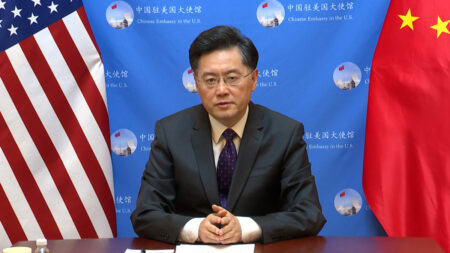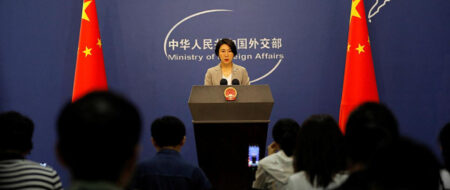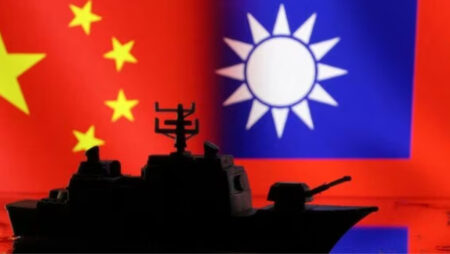US Nuclear Weapons In Japan
On account of Russia’ s invasion of Ukraine, Abe suggested that Japan break a long-standing taboo and engage in an active debate on nuclear weapons, including a prospective “nuclear-sharing” program similar to NATO’s.
Chinese officials have criticized Japan over former Prime Minister Shinzo Abe’s call to alleviate the country’s non-nuclear principles and consider hosting strategic US weapons to boost security amidst rising geopolitical tensions.
“Japanese politicians have frequently spread fallacies related to Taiwan and even blatantly made false remarks that violate the nation’s three non-nuclear principles,” Chinese Foreign Ministry spokesman Wang Wenbin told reporters on Tuesday.
Those principles include bans on possessing, producing or permitting the introduction of nuclear arms. Japan, the only country ever to be attacked with nuclear weapons, adopted a pacifist constitution after its crushing defeat in World War II.
Although, Abe said in a television interview on Sunday that Japan should no longer consider it. “taboo” to consider having nuclear weapons on its soil. He noted that several NATO members harbour US strategic weapons under nuclear sharing agreements with Washington, adding: “We need to understand how security is maintained around the world.”
Abe also called on the United States to commit to military intervention if Taiwan is attacked by China, ending its strategy of “ambiguity” On the question. A military collision between China and Taiwan would be a security emergency for Japan.
Wang said Japan’s leaders must be
“cautious in words and deeds on the Taiwan issue to stop provoking trouble.”He added“We strongly ask Japan to deeply reflect on its history.”
No less than 20 million Chinese were killed during World War II. Many of these deaths occurred during massacres of civilians by Japanese troops.
A war of aggression launched by japan against China and colonized Taiwan for half a century, committing unspeakable crimes,” Wang said. He suggested that some Japanese factions “do not come to terms with their defeat and still covet Taiwan.”
China’s state-run Global Times newspaper said in an editorial on Monday that Japan’s combination “right-wing madness” with the country’s weapons-making potential would lead to devastating consequences, including “an escape from the cage militarism that imprisoned him for almost 80 years.” The output added, “It is not only ironic, but also a huge real risk, that a group of people in the only country in the world that has been bombarded by atomic bombs would ask for an invitation to the culprit to deploy nuclear weapons on their own territory.”
Japan’s Policy On Nuclear Weapons
On Monday, Japanese Prime Minister Fumio Kishida told lawmakers that the country would not violate its non-nuclear principles. He called the idea of a nuclear sharing agreement with the United States “unacceptable.”
America dropped atomic bombs on Japan’s Hiroshima and Nagasaki towards World War II. Since then, the country has been campaigning for nuclear disarmament.
According to a poll conducted by Nikkei and TV Tokyo, more than three-quarters of respondents were concerned that failure to prevent a Russian invasion of Ukraine would empower China to attack Taiwan. Japan considers Taiwan’s security to be inextricably connected to its own, and the two regions have a different territorial issues.
Despite its pacifist constitution, Japan is primarily reliant on the United States “nuclear umbrella” for protection against adversaries such as North Korea and China. Declassified records suggest that the United States placed nuclear weapons on Okinawa before returning to Japanese control in 1972.
Kishida, a Hiroshima native who has made nuclear disarmament his life’s effort, is particularly sensitive about the subject. In 2016, he joined Barack Obama on the first visit by a sitting US president to the Hiroshima Peace Memorial.
No Nukes
Japanese Defense Minister Nobuo Kishi rejected the possibility of US nuclear weapons being deployed in the country after former Abe urged the Japanese authorities not to avoid discussing a system similar to the nuclear sharing concept of the North Atlantic Treaty Organization (NATO).
“If such a system implies that US nuclear weapons will be deployed on our territory even in peacetime, and can be placed on our fighters in case of emergency, it will never be allowed. There is no change in our position in the commitment to the three non-nuclear principles,” the minister said during the debate in the budget commission.
Japan’s three non-nuclear principles imply not possessing, not producing and not permitting the introduction of nuclear weapons in the country. The nuclear sharing concept, mentioned by Abe, is a strategy of joint use of NATO’s nuclear arsenal by member states.
Edited By- Kiran Maharana
Published By- Pawan Rajput












